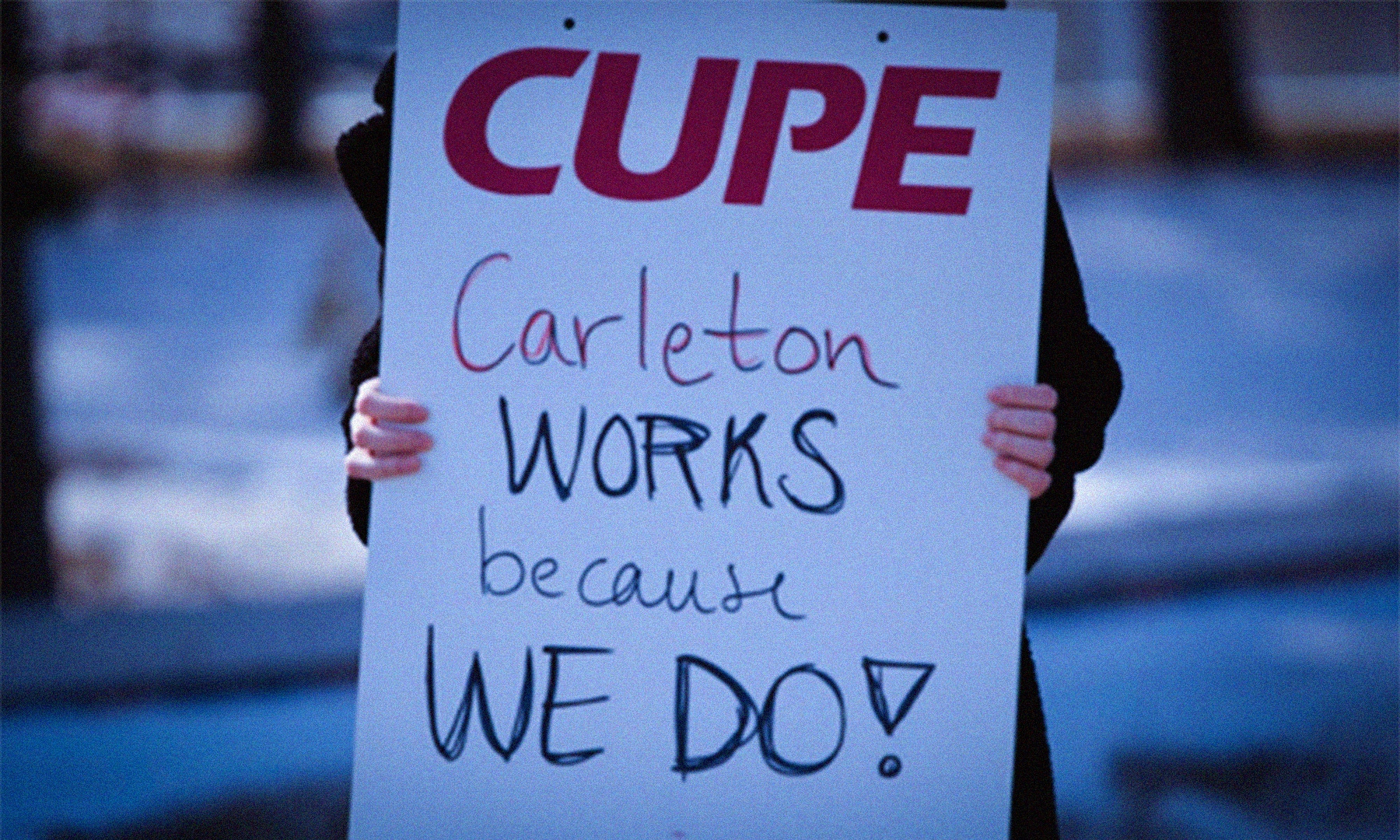Our content is fiercely open source and we never paywall our website. The support of our community makes this possible.
Make a donation of $35 or more and receive The Monitor magazine for one full year and a donation receipt for the full amount of your gift.
In March 2023, local 4600 of the Canadian Union of Public Employees (CUPE), representing Contract Instructors and Teaching Assistants at Carleton University, took to the picket lines. Local President Noreen Cauley-Le Fevre and Business Agent and Organizer Codie Fortin Lalonde explain the context and the significance of the job action, and what comes next.
What were the key issues underpinning the strike?
There were two groups (units) on strike: for both, the key issues were wages, TA-student ratios, and improved health benefits. In addition, Unit 1 (Teaching Assistants, Service Assistants, and some Research Assistants) had demands regarding End of Term stipulations around marking over the holidays, and for Unit 2 (Contract Instructors [CI]), an additional issue became Intellectual Property rights.
Predictably, the University stalled on key issues, and tried to divide the Units. The union tabled intellectual property language with the University on November 18 (2022), but did not receive a response until March 21—5 days from our strike deadline—with truly egregious language that would have given the University unlimited license to do anything they wanted with CIs’ course materials. So what first seemed a stalling tactic or red herring became Unit 2’s central issue and garnered international attention and widespread academic solidarity. Considering that much of this battle at the bargaining table was waged in the wee hours of the morning and that they had an arsenal of board of governors members and lawyers against our demands, we came out with incredibly protective language.
For Unit 1, the Employer stalled on the issue of TAs having to mark past the end of term into the holidays (between Dec 24 and the first week of January). But after a late night discussion mid-March, they ended up surprising us with a really thoughtful LOU addressing the issue quite robustly. It showed us that they are capable of working creatively with us when they want to. For TA-Student ratios, Management refused to engage, and repeatedly crossed out our proposed language. We’re preparing to continue working on this issue through Campus United.
When it came to wages, the University again avoided giving us a bottom line until very late into the process. They finally agreed to move on Unit 2 wages (14% over 3 years), but refused the same for Unit 1’s graduate TA wages (only 9% over 3 years). However, we did succeed in closing some of the wage gap between undergraduate and graduate TAs (13.5% over 3 years for undergrad TAs).
What did you hear from members on the line?
We heard a mix of excitement, concern and anxiety, courage, and anger. From long-time members, we heard that they were so proud that we were finally striking after all these years. For many members, this was their first strike and it was a huge learning experience.
Anyone who has experienced a strike will understand that different picket lines take on different personalities based on their location and the kinds of interactions and issues they experience together. We heard about those experiences—for example, aggressive drivers putting people in danger or the solidarity felt from rallies held by other campus Unions.
After the first few days, we started hearing questions about bargaining and how long the strike would last. Into week two, members were concerned about how long the strike could continue and how long they could realistically hold the line based on the money they received for picketing. These concerns were often bookended with sentiments of support for the strike and their union, and a commitment to hold the line for as long as possible.
What did the final Minutes of Settlement (MOS) include? What other issues need to be addressed going forward?
The MOS include things like agreement on return to work dates and retroactive aspects. When we came back to the table for Unit 1 and had concluded bargaining, we were planning to negotiate the MOS and Return to Work (RTW) Protocol. But after negotiating the MOS, the University refused to engage in a discussion about the RTW.
The University also imposed a wage clawback of 15 hours ($638, 12% of their stipend) from Unit 1 Members and 9% per 0.5 credit contract (roughly $678/contract) for Unit 2 members. This seemed arbitrary and punitive: some TAs finished their hours before the strike started; most missed only 2-3 hours of scheduled duties such as tutorials or office hours. For CIs, the work was still there—as teachers, they had to finish their courses and marking. We’re currently filing grievances and exploring our options with the Labour Board.
The University also turned to a SAT/UNSAT grading scheme, which meant that students who had a D- or higher in an undergraduate winter 2023 or a full year 2022-23 course could simply convert their grade to SAT (satisfactory). This decision undermined the need for TAs to finish their contracts upon return and sidestepped anti-scabbing rights of CIs and full-time faculty members. It was undoubtedly a punitive measure aimed by the University at striking workers.
What were some key moments?
The first was both bargaining teams, at the direction of the membership, making the decision to go on strike. No matter the preparation, when it came down to that moment, the weight of that decision was felt deeply by the bargaining teams.
During the strike, one of the turning points was winning the Intellectual Property language for CIs. The second was learning that the University wasn’t going to budge on Unit 1 wages and was planning to leave grad students out on the lines (similar to the York strike).
The strike was no small undertaking. It took a massive amount of time, planning and strategy, organizing, and learning on our feet. We often say that bargaining improvements into Collective Agreements is done in baby steps, but these two Collective Agreements have made leaps and bounds. While we can’t win everything or please everyone, we’re incredibly proud of what we accomplished here.
On April 4, after seven days on the picket line, CUPE Local 4600, Unit 2 (Contract Instructors) at Carleton University in Ottawa ON signed a new collective agreement with their Employer. On April 6 after nine days on the picket line, Unit 1 (TAs, research assistants and service assistance) signed a new collective agreement with their employer. The CAs will be accessible at cupe4400.ca.


